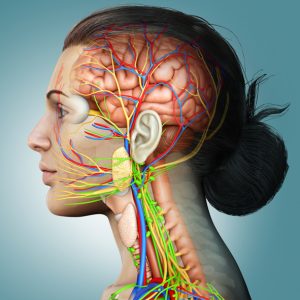By: Cat Ebeling, RN, MSN-PHN, co-author of the best-sellers: The Fat Burning Kitchen, The Top 101 Foods that Fight Aging & The Diabetes Fix
We seem to be a nation of anxious people. And yes, the events of the past couple years can make us more anxious, but a lot of anxiety is just generalized anxiety. Anxiety can also add to irritability, anger and stress. Anxiety can make it difficult to work, deal with day-to-day decisions, and it affects your relationships. Often it just simmers in the background, leaving you feeling ‘on edge’ all the time.
While many people run to the doctor for an anti-anxiety prescription, which is difficult to stop once you start, and often has unpleasant side effects.
You can realistically manage your anxiety far better by fixing it at the source, avoid prescription medications, and improve your overall health. And—surprise—fixing anxiety doesn’t start with your head; it starts with your gut.
Specific bacteria in the gut are responsible for creating about 90% or more of the serotonin in our bodies. Serotonin is the brain chemical responsible for helping you feel calm and happy. Yes, a brain chemical that is made in the gut. Let’s go into a little anatomy lesson to see how this works.
The enteric nervous system in the gut and the central nervous system were formed out of the same tissue in fetal development. So actually, the nervous system in the gut, which is quite extensive, is like a ‘second brain’. These two nervous systems have a direct line of communication via the vagus nerve, which runs from your brain stem to the nervous system in your gut.
This nervous system in the gut is made up of sheaths of neurons embedded in the walls of the entire gut, which is about 9 meters long from the mouth to the anus. This second brain contains somewhere around 100 million neurons—more than in either the spinal cord or the peripheral nervous system!
Certain gut bacteria play a very important role in immunity, synthesizing nutrients from the food you consume, and creating chemicals that help the brain and our emotional and mental health.
What I find very interesting, however, is that about 90% of the fibers in the vagus nerve in the digestive system actually carry information from the gut to the brain, and not the other way around. So, you see, the gut controls the brain to a large extent. These messages from the gut to the brain can have a powerful influence on moods, including anxiety and depression.
Scientists also know that the bacteria in the gut manufactures around 90% of the body’s serotonin, an important brain chemical directly affects moods, like anxiety and depression as well as some mental illnesses, such as bipolar, schizophrenia, and OCD.
Other symptoms of low serotonin besides anxiety and depression include, low energy, anger, craving of carbohydrates and sweets, and reduced interest in sex.
How to support the serotonin factory in your gut
Many of us have diets (whether we realize it or not) that are contributing to inflammation in the gut. Inflammation can come from eating a diet high in processed foods, too much conventional dairy, processed vegetable oils, too much sugar and other food allergies or sensitivities like gluten, corn and even foods that were sprayed with glyphosate.
Note: glyphosate is a very common herbicide used in the United States, and sprayed on most all (except organic) grains and legumes to dry them out before harvest. Glyphosate has been shown to kill off beneficial gut bacteria, upsetting the gut’s ability to create serotonin. In fact, glyphosate has been shown to increase both anxiety and depression in animal studies.
Individuals with Irritable Bowel Syndrome (IBS), celiac disease or gluten sensitivity tend to report increased levels of anxiety due to the inflammation that exists in the gut. There is a definite link between gluten issues and anxiety and depression. Our gut bacteria are also highly susceptible to:
- Chlorinated and fluoridated water
- Antibacterial soap
- Herbicide and pesticide residue in food
- Air and water pollution
Taking care of our gut
First of all, if you have any type of IBS, gluten sensitivity, or food allergies, or if you have ever had issues with anxiety, depression, or any other mental or emotional issues it’s time for an elimination diet.
Eliminate:
- Gluten
- Corn
- Dairy
Often this one step will make a huge difference.
The next step is to eliminate all processed foods. Stop eating sugar, especially the kind that is added to food like high fructose corn syrup (usually in processed foods). Processed foods feed harmful bacteria and candida.
Important to totally avoid consuming any vegetable seed oils such as canola oil, sunflower oil, cottonseed oil, corn oil, soybean oil. These oils have been proven to be cancer-causing, increase your chances of Alzheimer’s, are highly inflammatory, and instrumental in causing anxiety and depression.
Many people find amazing relief from anxiety and depression when they correct their diet and take out offending foods. And, eating a healthy, whole foods diet with lots of fresh organic vegetables, a little bit of fruit, plenty of naturally raised meat, and healthy saturated fats actually feeds the good bacteria in the gut.
Apples, artichokes, blueberries, almonds, and pistachios have also all been shown to increase Bifidobacteria in humans. Bifidobacteria are considered beneficial bacteria, as they can help prevent intestinal inflammation, and prevent anxiety.
Adding in a broad-spectrum probiotic supplement containing Bifidobacterioum longum and Lactobacillus rhamnosus will also spur the growth of this healthier bacteria colony.
Other things that can increase anxiety are alcohol, too much sugar, not enough sleep, not enough exercise, estrogen dominance (a common condition in perimenopausal and menopausal women), too much caffeine and some medications.
A multi-B vitamin containing methylfolate, and methylcobalmin, has also been shown to effectively manage anxiety and depression—which often go hand in hand. Other valuable nutritional supplements include magnesium, zinc, omega 3’s, and choline—a nutrient often very low in menopausal and post-menopausal women.
 thenutritionwatchdog.com What's in your food? Discover which "healthy" foods are harming your health and which foods protect your body
thenutritionwatchdog.com What's in your food? Discover which "healthy" foods are harming your health and which foods protect your body 